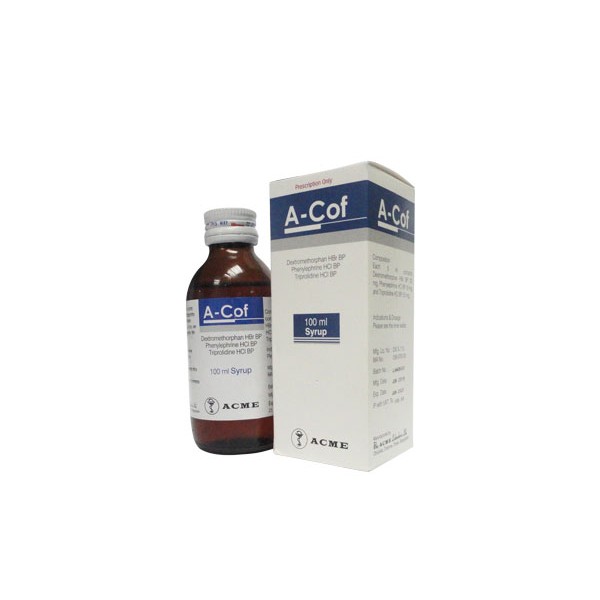
- Stock: In Stock
- Brand: Acme Laboratories Limited
- Product ID: Dextromethorphan + Pseudoephedrine + Triprolidine
100% Secure Payment

A-Cof 100ml Syp
Composition
Each 5 ml contains Dextromethorphan Hydrobromide BP 20 mg, Phenylephrine Hydrochloride BP 10 mg and Triprolidine Hydrochloride BP 2.5 mg.
PHARMACOLOGY
Dextromethorphan Hydrobromide is a cough suppressant used to treat coughing. Phenylephrine Hydrochloride stimulates postsynaptic alpha-receptors, resulting in vasoconstriction, which reduces nasal congestion. Triprolidine Hydrochloride is a sedating antihistamine which is used for the symptomatic relief from allergic rhinitis.
Indications
Temporarily relieves these symptoms due to common cold, hay fever (allergic rhinitis) or other upper respiratory allergies:
• cough due to minor throat of bronchial irritation
• runny nose
• sneezing
• itching of the nose or throat
• itchy, watery eyes
• nasal congestion
• reduces swelling of nasal passages
Dose and Administration
Route of Administration : Oral. Adults & Children 12 years of age and older : 1 teaspoonful (5 ml) every 4 hours. Children 6 to under 12 years age : ½ teaspoonful (2.5 ml) every 4 hours. Or as directed by the physician. Contraindications
• Patients with hypersensitivity to Dextromethorphan Hydrobromide, Phenylephrine
Hydrochloride and Triprolidine Hydrochloride.
• Persons under treatment with Monoamine Oxidase Inhibitor (MAO) within 2 weeks of stopping such treatment.
Precaution and Warning
As with other sympathomimetic agents, caution should be exercised in patients with hypertension, heart disease, diabetes, thyroid disease or glaucoma. This combination should not be used for persistent or chronic cough which occurs with smoking, asthma, chronic bronchitis or for a couth with excessive secretion of phlegm unless directed by a physician. Precaution should be taken for persons with trouble urinating due to an enlarged prostate gland. This combination may impair the patients ability to drive and also to operate machinery.
Side Effects
Common Side Effects : It may cause drowsiness, dottiness and constipation. Other side effects that may occur include GIT discomfort. Rare Side Effects : Other less common side effects may include transient hypertension, dry mouth, restlessness, palpitations, allergic reactions such as rashes, tightness of chest, thickening of bronchial secretions, toxic psychosis and blood dyscrasia. Use in Pregnancy & Lactation There are no specific data on use of this combination during pregnancy and lactation. Use in children & adolescents Not to be used in children below 2 years old. To be used with caution, and as advised by the physician for children age 2 to 6 years.
Drug Interaction
With medicine : Taking certain MAO inhibitors with this medication may cause a serious (possibly fatal) drug interaction. Avoid taking isocarboxazid, methylene blue, moclobemide, phenelzine, procarbazine, rasagiline, selegiline, or tranylcypromine during treatment with this medication. Most MAO inhibitors should also not be taken for two weeks before treatment with this medication. Caution should be excercised while taking this drug with antihistamines applied to the skin (such as diphenhydramine cream, ointment, spray), antispasmodics (e.g. atropine, belladonna alkaloids), beta blockers (e.g. metoprolol, atenolol), drugs for Parkinson’s disease (e.g. anticholinergics such as benztropine, trihexyphenidyl), guanethidine, certain inhaled anesthetics (e.g. halothane), methyldopa, reserpine, scopolamine, tricyclic antidepressants (e.g. amitriptyline, desipramine), anti-seizure drugs (e.g. carbamazepine), medicine for sleep or anxiety (e.g. alprazolam, diazepam, zolpidem), muscle relaxants, narcotic pain relievers (e.g. codeine), psychiatric medicines (e.g. chlorpromazine, risperidone, amitriptyline, trazodone). With food and others : There is no data found on interaction with food of this medicine.
Over dosage
In cases of over dosage, hospital admission is strongly advised. Over dosage may produce respiratory depression, paranoid psychosis, delusions, hallucinations, and convulsion. Treatment should include emptying the stomach by aspiration or gastric lavage. Nervous stimulation and convulsions should be treated with a sedative such as diazepam intramuscularly. If marked excitation is present, a sedative such as diazepam or a short-acting barbiturate may be given. Severe over dosage of phenylephrine hydrochloride may produce hypertension and associated reflex bradycardia. Treatment measures include early gastric lavage and symptomatic and supportive measures. The hypertensive effects may be treated with an alpha receptor blocking agent (such as phentolamine mesilate 6-10 mg) given intravenously, and the bradycardia treated with atropine, preferable only after the pressure has been controlled.
Storage
Keep all medicines out of reach of children. Store below 300 C., Protect from light.
Packing
Each bottle contains 100 ml syrup.




























